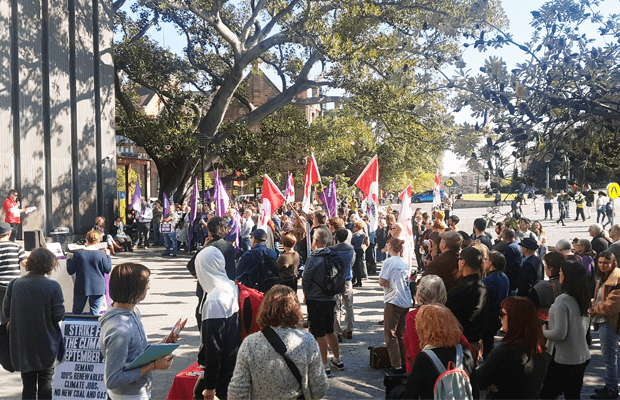Last Wednesday, union members on campus rallied for the SOMething Rotten protest against the recent slate of mismanaged changes across the University of Sydney (USyd).
Much of what university staff are angry with stems from the Sydney Operating Model (SOM). Rally host and National Tertiary Education Union (NTEU) member Alma Torlakovic explained that SOM encompasses hundreds of pages of change proposals from university management, aiming to cut costs by making staff redundant, all the while forcing remaining staff to absorb their workload.
“The other thing [management] want with SOM is to make staff feel like it is their own individual responsibility,” Torlakovic said, taking aim at the Employee Assistance Program that the University refers staff with employment issues to. A member of the crowd yelled back “Employee Resistance Program!”, which became something of a rallying cry of the protesters.
Sophia Gluyas, the other host of the rally, explained the broader context of the protest, with reference to Shakespeare’s Hamlet, outlining the culture of corruption, bullying and gaslighting perpetrated by management and embodied in the SOM.
Awabakal man Jeremy Heathcote began the rally with an acknowledgment of country, criticising the university because “no one is looking after Aboriginal staff and student recruitment.” Heathcote praised the union as “a strong supporter of Aboriginal issues”.
USyd NTEU Branch President Kurt Iveson took up a range of issues with the university in his speech, saying that while the University aims to demoralise staff, the union must instead not only democratise, but also decolonise, the university. For 165 current staff in the Faculty of Medicine and Health, the current change proposal fails to map the future of their jobs. Staff in student admin are monitored every second of their working day and even sent “mystery shoppers” to check on their dress and performance.
Iveson claimed that fear, precarity and intimidation are being used against staff by a university management advised by corporate consultants. As a result, over 500 pages of staff responses in the Faculty of Medicine and Health are being ignored with cut and paste responses which at best refer staff to the Employee Assistance Program. Iveson challenged the crowd to take action, asking “Are we going to let them manage our wonderful schools and faculties like their bank branches?”
Community and Public Sector Union USyd Branch President Grant Wheeler drew attention to lesser-known issues perpetrated by the SOM. He accused the University of suspending the conditions upon which a position can be made fixed-term. The University rejects this.
Wheeler claimed that compared with January 2016, when there were approximately 58.5% more fixed-term positions advertised than continuing positions, in 2019 there are 386% more fixed-term positions advertised than continuing positions. He added that out of 13 vacancies advertised last Friday morning, 12 were fixed-term contracts. Wheeler took aim at USyd Vice-Chancellor Michael Spence, who earned $1.5 million in 2018, and others in senior management, noting that only the Provost can decide if a position should be fixed-term rather than ongoing. The Chief Operations Officer decides this for professional staff.
From Fisher, the crowd marched through the University of Sydney Union Fair Day, to the F23 Administration Building to deliver more speeches. The crowd chanted “SOMething rotten, SOMething rotten, restructures be forgotten,” and, “Hey Spence you’re no good, treat your workers like you should.”
Robert Boncardo from the School of Languages and Cultures spoke outside. He drew attention to the fact that 50% of USyd staff are precariously employed as casuals, and that even academics supervising theses, writing books and publishing two to three times the academic articles required of them are still being refused conversion to ongoing employment. He also took issue with universities, across the sector, abusing what few democratic processes they have left — USyd with the proposed changes to the Anderson Stuart Building, and UQ and UOW with the Ramsay Centre.
Introduced by Sophia Gluyas as an “all-round badass,” Education Action Group activist Jack Mansell closed the rally by arguing that students see through changes, promoted as improving flexibility and efficiency, that are really about cost-cutting.
He highlighted that staff had students backs when education cuts were attempted in 2014 and 2017, and took shots at “corporate management and the governments that back them up,” because in the neoliberalised university “students pay for it in the end.”





